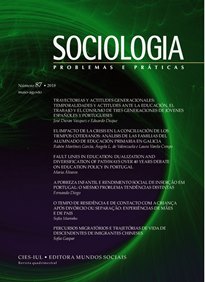Residency and contact time with children after divorce or separation: mothers and fathers’ experiences
DOI:
https://doi.org/10.7458/SPP20188710330Keywords:
Sociologia, Ciências SociaisAbstract
The article explores the practices and subjective meanings that allocate parenting time and its influence in shaping parental roles, identity and the relationship with the child both among separated mothers and fathers, and in divorce law. Drawing on an online survey, results reveal that the law preserves the use of gender to allocate parental time in the regime of residence and contact. In this regime, resident mothers experience the interplay between affective and identity gratification, and parental overload. Instead, nonresident fathers cope with parental deprivation and submission to traditional fathering. In the regime of shared residence, parents are engaged both in equal parenting and in the challenges of adjusting different parenting styles, which are not always accepted by the law.Downloads
Published
2018-03-28
Issue
Section
Articles
License
Authors who publish in this Journal must agree the following terms and conditions:
- Authors retain copyright and grant the Journal the right to first publication, while simultaneously agreeing to a Creative Commons Attribution License, which allows others to share their work on condition that they cite the original author(s) and recognise that the latter’s work was first published in this Journal.
- Authors are authorised to enter into additional contracts separately, for non-exclusive distribution of the version of the work that is published in this Journal (e.g. publication in an institutional repository or as a book chapter), subject to recognition of initial publication in this Journal.



